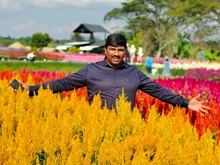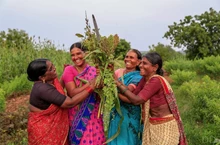
As a preventive step, the government in Punjab's province has turned off the electricity in high-tension cables that pass-through farms. Over the past two weeks, a combination of severe early-summer temperatures and scorching dry winds over the north-Indian plains has sparked dozens of unusual agricultural fires in food-bowl states, devastating areas of harvest-ready wheat fields in at least four of them.
Farmers have been warned to take care by authorities, who say the scorching conditions that are causing the flames are unlikely to subside very soon. They warned that if left unattended, these fires could spread to inhabited areas.
Over the last two weeks, ripening wheat harvests have set fire throughout Uttar Pradesh, Rajasthan, Punjab, and Haryana, according to farmers and officials. In a country where half of the population relies on agriculture for a living, the winter staple is a major source of farm income.
Farmers in Rajasthan and Punjab have been advised to be cautious, avoid smoking near fields, and store flammable materials such as insecticides and farm chemicals. As a preventive step, the government in Punjab's food-bowl province has turned off the electricity in high-tension cables that pass-through farms.
"Vegetation has become brittle and dry due to extreme temperature conditions and a lack of rainfall." According to Binayak Ghoshal, a former India Meteorological Department officer, "this makes crops easily flammable." He claims that a carelessly thrown cigarette butt is enough to start a wildfire.
North India will continue to experience extreme heatwave conditions in the next few days, according to Navdeep Dahiya, a forecaster and the CEO of Live Weather of India. He predicted that the temperature would continue high, between 40 and 46 degrees Celsius.
According to state officials, HT spoke with, at least 36 incidents were reported from the above states. Farmers rushed to put out fires with tractor-mounted water guns or by flattening sections of wheat crops to prevent them from spreading.
Climate-change-induced heatwaves and drought, according to the IPCC's landmark Code Red report, will increasingly cause forest and wildfires around the world. Farm activist Ramandeep Singh Mann said he had received reports of at least 1,000 crop fires in the last few weeks, but that no compensation from the government had been offered.
Harvesting of wheat has begun in the world's second-largest producer, which plans to export between 7 and 12 million tons to cover a shortfall in global supply caused by Russia's invasion of Ukraine.
Singh shared a video from Rajasthan's Ganganagar area on Sunday, showing farmers fighting a big fire in a ripening wheat field while plumes of thick, black smoke rose from burnt biomass. Nearly 10 acres of wheat were wiped out in Chotia Kalan in Punjab’s Moga district, while another large blaze in Barnala district last weekend was brought under control after authorities deployed fire tenders, said Iqbal Singh, a district official. Moreover, in Haryana’s Panipat, a massive blaze in Adhmi village swept through 30 acres of wheat, causing massive losses last week.











